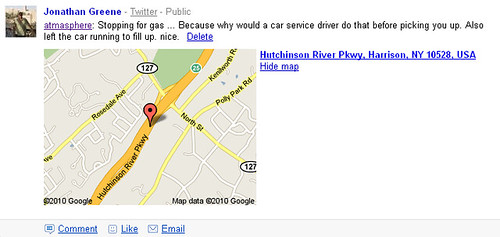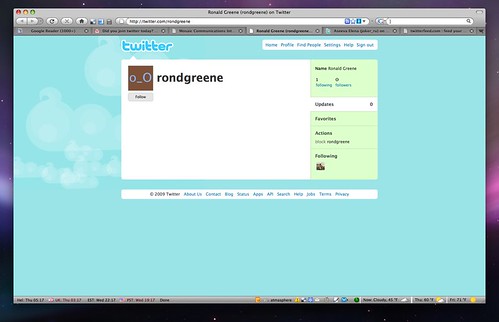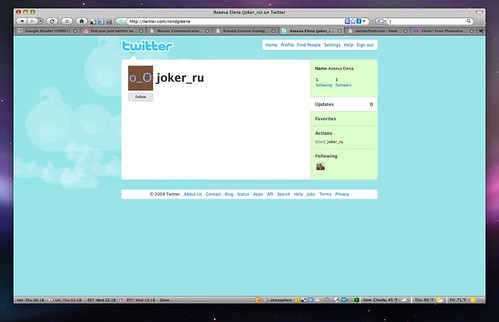Twitter Engineering reveals how they ensure short term spikes in search lead to qualified content. Pretty awesome. The new news.
Twitter photo filters go live, but why?
When I learned via The Verge that Twitter’s long rumored photo filters were live for Android, I loaded up the Google Play Store and updated my app to snap my first filtered pic. The experience was certainly functional, but that’s about it.
Twitter image with filter. Probably won’t use this much. twitter.com/atmasphere/sta…
— Jonathan Greene (@atmasphere) December 10, 2012
I don’t ever snap pics from within the Twitter app to start so that makes it a long shot right from the beginning for my usage … That said, just adding a filter doesn’t really make a difference to limited sharing experience. Instead, Twitter seems to have released a very poor man’s Instagram – and right after Instagram decided to remove it’s twitter card-based sharing.
Unfortunately for Twitter, simply adding a filter to an image doesn’t change how sharing, discussion or notifications work within their system … all critical features elsewhere. Twitter is a very real time focused zone and that’s it’s real strength. There is limited if any threaded discussion (no real threads) and certainly nothing really orgainzed fashion at the core of the service either. By comparison, when I share a picture on Facebook, Instagram, PicPlz (now dead), Google+ or others you can create social engagement around that object. Twitter does make things easy enough to link to, but there’s no sense of activity on that shared piece and no real draw back to it from those who have engaged. Those last two pieces are what twitter needs to fix … Disposable stylized media was the easy part.
Why Social TV Is Failing
This post on TechCrunch by the CEO of Miso is well worth a read.
While it’s easy to get excited about the prospects of the second screen, it’s too hard and complex compared to the simplicity of twitter (or fb updates) … which is the default behavior. Until there’s a consumer benefit and real value equation things are likely to continue trudging along …
A Map of Twitter Followers
Very cool …
Twitter locations are being shared
I guess I’ve missed this previously, but I was pleasantly surprised to see that tweets posted with locations are fully shared to Buzz. This is how things should absolutely work, but often times (like with foursquare) you have to click through to see the place rather than simply marking the post.
This tweet was posted via Tweetie 2 with location sharing on … in case you were wondering.
It’s called Facebook
Seth, meet Facebook. Facebook, Seth.
PS If I ran Twitter, I’d build my new ad service about a socially acceptable way for corporate users to build large lists of followers, people who would give permission to get news and discounts and insights from advertisers. Twitter knows who likes what and they have permission from users to be a bridge between the user and those that might want to talk to them. That’s a powerful place to be.
Please don’t turn location updates into info spam
As more people start to use location services like Foursquare Gowalla we are starting to see an influx of I’m here posts across Twitter and Facebook which is annoying but more importantly carries no value.
In my own usage I find that the pure check-in action stays within the location network. Anyone who’s linked to me there can see that as desired. By choosing not to share that simple pin on the map claim, I’m doing two things … not sharing my location directly and reserving the attention any social network friends might have for something I actually have to say. If I have something to say about the location I’m in, I might choose to push that out to both twitter and Facebook as an update to add a bit of additional context to what I’m doing.
Location should be something of interest. When we can connect to each other in a meaningful way, things get interesting and should add value to the potential of our conversations as well as lead to potential experiences.
Location, location, location!
In the past few years, I feel like I’ve tried just about every location service. Some have certainly offered more than others, but one thing has been sadly consistent and that’s absolutely no consistency in access to your data. If 2010 can bring one thing, I hope it’s a simplified and federated view into our location data.
Social location services are a very interesting area. I’ve dabbled across various apps to try and find the magic but have come up short. The potential is there, but because no one service or perhaps suite of tools enables
- the right degree of privacy control
- proactive friend notifications
- base of users and importantly a way to contact each other either publicly or privately
A quick look back at the list of things I’ve tried in no particular order… Jaiku, Twitter, Latitude, Nokia FriendView, Loopt, Brightkite, waze, Stalqer, dopplr, tripit, fire eagle, Foursquare and Gowalla. Of all these, only Fire Eagle and Dopplr currently talk and a quick check on Fire Eagle tonight revealed I am in Singapore yet I write this from Katonah, NY. Dopplr actually knows that’s where I am but for some reason has not shared this info with FE … not that it matters for now.
There’s a clear issue with all of this. There is no way to share my location data easily across services and situations. Instead I have to explicitly state or open the app I want to use in order to have things update and shared across my social network. Unlike status messages, location is not a subjective thing, it’s actual. You can and should be able to share the degree of accuracy people see and Latitude does this well. Even the two competing check-in services FourSquare and Gowalla do it differently… Foursquare requires and address if you want the place to be used by others while Gowalla places a pin on the map via GPS. I prefer the GPS method personally as I almost never know or want to take the time to find the address to simply check-in. If I fire Latitude up my location will be highlighted within a few moments, but that’s not something I can actually use.
Speaking of using … the three points I was initially making all clearly tie together.
- I need to have total control over how my location information is shared. I rarely want to show when I am in my home, but showing the town is cool.
- With friends in the system, I want to know when they are close and see that as prioritized info in whatever view I’ve got within the app. For some reason this is not the case with anything. Latitude sorts randomly when you browse the map, Foursquare sorts by time and Foursquare, Gowalla and Stalqer give me updates on everyone regardless of where they are. While there are some modifiable settings, it’s not even close to granular enough to be valuable in this context.
- Having friends in the system is important and since this space is still fragmented there are too many options to choose from to find your friends. Stalqer did an admirable job linking through Facebook, but Facebook doesn’t actually have a native location system.
Twitter and Facebook will probably duke this out in the end with some competition from Google. Currently twitter supports location and you can geo-tag tweets via various mobile clients, but this information is so hidden from the main view, it’s essentially a waste to even bother. Google has quite a few pieces behind the scenes, but so far has not taken them anywhere. You’ll notice I’ve got a location widget on the sidebar of my blog which will show city-level views via Latitude. Other than that Latitude is mainly a view only layer on Maps.
I’m sure 2010 will be a hype filled year for location services. I’m really hoping we’ll see standards that will let these things work together. I don’t want to entrust my location data to a single provider (yet) though if someone was able to develop the right open federation model it would make things very interesting.
What happens when your twitter account is hacked?
This morning I received an email that my dad had joined twitter. It wasn’t from him, but the usual notification and I assumed it was him based on the username. I followed back and sent a direct over as well. Then nothing … though not that unexpected given my dad was probably trying to figure out what to even do with twitter.
I checked back this evening and see that the name and handle have changed though the twitter URL is the same. I checked with my dad and he can no longer login. It appears his account has been hacked … My guess is this will eventually be a spammer account, though who knows. I’m still the only person they are following.
I have no idea how this has happened or what can be done, but am putting it out there in case someone else has any clues.
What would Facebook hope to get from Twitter?
Techcrunch is reporting on Twitter’s decision to pass on an acquisition by Facebook and a lot of people are tracking this like a major news story. Â I think it’s just the continuation of the hype machine.
I’m not the biggest fan of Twitter … I consider it interesting, yet frustrating given their sheer lack of concern for actual conversation. Â While it’s been able to attract a core early adopter set and the blogger “A-List” it’s way too challenging for a mass market audience to use. Â In the time since it’s launch we’ve seen the release of an API which has certainly made posting and tracking simpler, but since there’s neither threading nor notification alerts it’s quite easy to just miss a reply if you happen to look away.Â
Facebook on the other hand recently redesigned their service with a focus on status updates and seems to have eclipsed the intent of Twitter with a far richer experience. Â I’ve found the facebook threading and alerts to be excellent and as a result have actually found myself in Facebook far more often than I was previously. Â Granted there is no public timeline in Facebook and discovering new people of interest is much harder since it tends to happen through the friend of a friend mechanism. Â
Facebook has a considerably greater audience globally, an excellent mobile experience and a foundation based on sharing between friends. Â Twitter has remained a glorified IRC chat room where everyone shouts and you are out of the flow if you stop paying direct attention for a few minutes. Â
Â
The Facebook userbase almost certainly includes most of the Twitter base so what’s really to acquire here? Â The brand perhaps … I suppose there’s credibility there and the alleged offer of $500 Million even as Facebook stock has to be quite flattering. Â That said, it is stock not cash and there’s certainly no certainty playing that game these days.
Yahoo! Announces OneConnect at the Mobile World Congress
Yahoo announced OneConnect an amazingly cool service today that looks like a truly killer mobile social connector.  OneConnect will allow you to view and participate across social networks in a a way much like Jaiku does now – though it seems like it will work for most of your existing social services. It´s not ready for release quite yet and details of exactly how it works were hard to confirm, but here´s a video of what you can expect.Â
I´m very excited by this and see that Yahoo! has finally come forward with something exciting in mobile. Because the mobile is something you always have with you it´s truly the key piece in staying connected. That the OneConnect service will work with and outside the Yahoo! ecosystem is what makes it truly compelling. This application goes well beyond my notion of lifestreaming and looks like it will truly change the way in which we connect.Â



